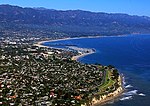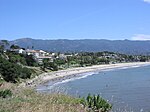Mesa Oil Field
20th century in CaliforniaGeography of Santa Barbara County, CaliforniaHistory of Santa Barbara, CaliforniaHistory of Santa Barbara County, CaliforniaLandforms of Santa Barbara County, California ... and 5 more
Mesas of CaliforniaOil fields in Santa Barbara County, CaliforniaPages with non-numeric formatnum argumentsSanta Barbara, CaliforniaUrban oil fields

The Mesa Oil Field is an abandoned oil field entirely within the city limits of Santa Barbara, California, in the United States. Discovered in 1929, it was quickly developed and quickly declined, as it proved to be but a relatively small accumulation of oil in a single geologic formation. While the field was active in the 1930s, residential development in most of the Mesa neighborhood of Santa Barbara came to a halt. The field included two major productive areas with a total surface extent of only 210 acres (0.85 km2), and produced 3,700,000 barrels (590,000 m3) of oil during its brief lifetime.
Excerpt from the Wikipedia article Mesa Oil Field (License: CC BY-SA 3.0, Authors, Images).Mesa Oil Field
San Miguel Avenue, Santa Barbara
Geographical coordinates (GPS) Address Nearby Places Show on map
Geographical coordinates (GPS)
| Latitude | Longitude |
|---|---|
| N 34.3997 ° | E -119.7111 ° |
Address
San Miguel Avenue 1321
93109 Santa Barbara
California, United States
Open on Google Maps








